Examining Cloud Computing Ethics: An In-depth European Case Study
VerifiedAdded on 2021/06/16
|7
|1585
|78
Case Study
AI Summary
This case study explores the ethical issues surrounding cloud computing, focusing on a European context. It discusses ethical considerations related to ICT professionalism, privacy, security, cybercrime, intellectual property, internet regulation, social inclusion, community identity, and pervasive computing. The analysis applies ethical theories such as Utilitarianism, Deontology, Virtue Theory, and Contract Theory to evaluate the ethical dilemmas presented by cloud computing. It emphasizes the importance of legal agreements and service level agreements (SLAs) for preserving data confidentiality and integrity. The study concludes that while cloud computing offers numerous benefits, addressing the associated ethical and social issues is crucial for responsible implementation and use. This document is available on Desklib, a platform offering a range of study tools and solved assignments for students.

Topics in Ethics
Paraphrase This Document
Need a fresh take? Get an instant paraphrase of this document with our AI Paraphraser
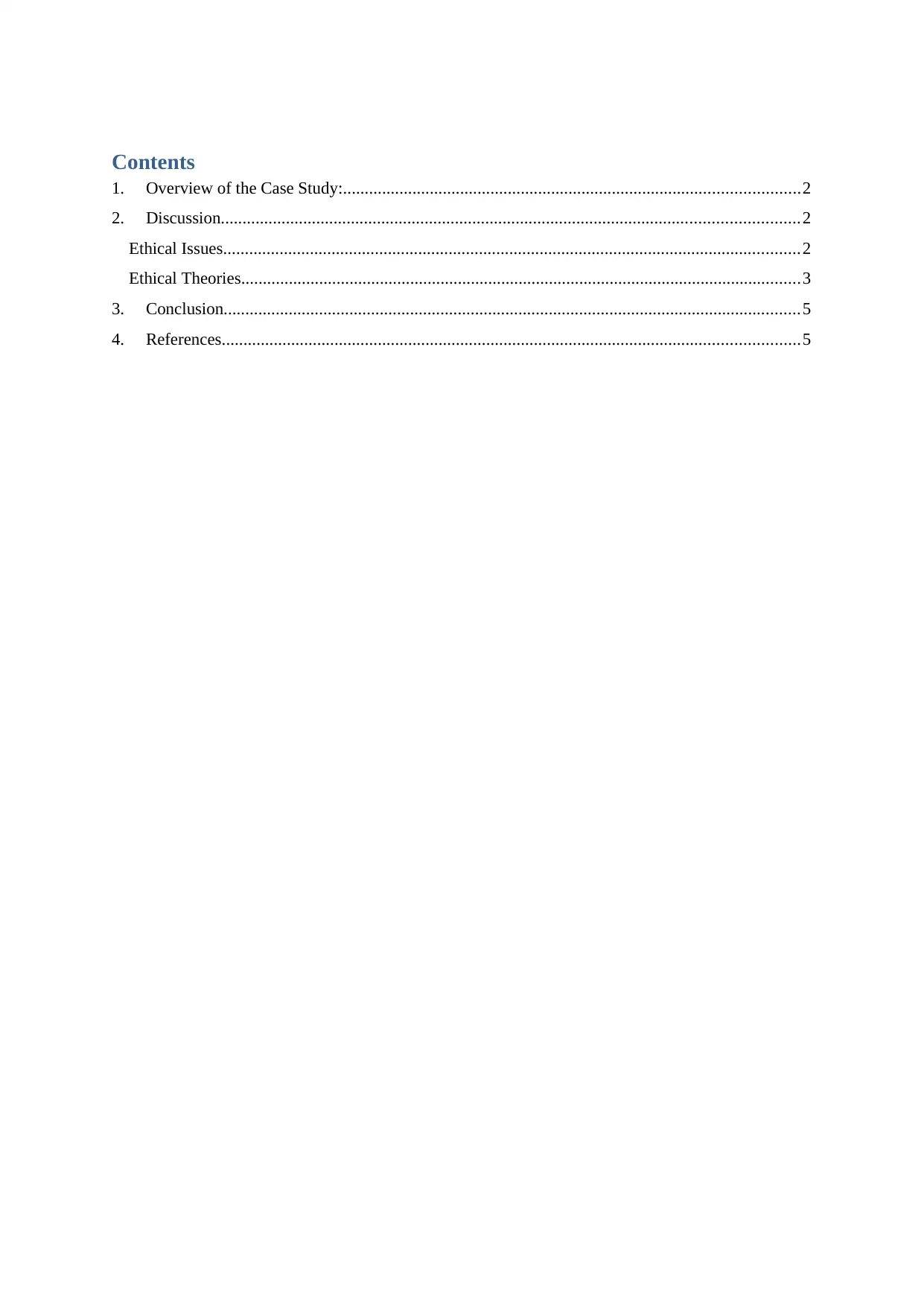
Contents
1. Overview of the Case Study:.........................................................................................................2
2. Discussion.....................................................................................................................................2
Ethical Issues.....................................................................................................................................2
Ethical Theories.................................................................................................................................3
3. Conclusion.....................................................................................................................................5
4. References.....................................................................................................................................5
1. Overview of the Case Study:.........................................................................................................2
2. Discussion.....................................................................................................................................2
Ethical Issues.....................................................................................................................................2
Ethical Theories.................................................................................................................................3
3. Conclusion.....................................................................................................................................5
4. References.....................................................................................................................................5
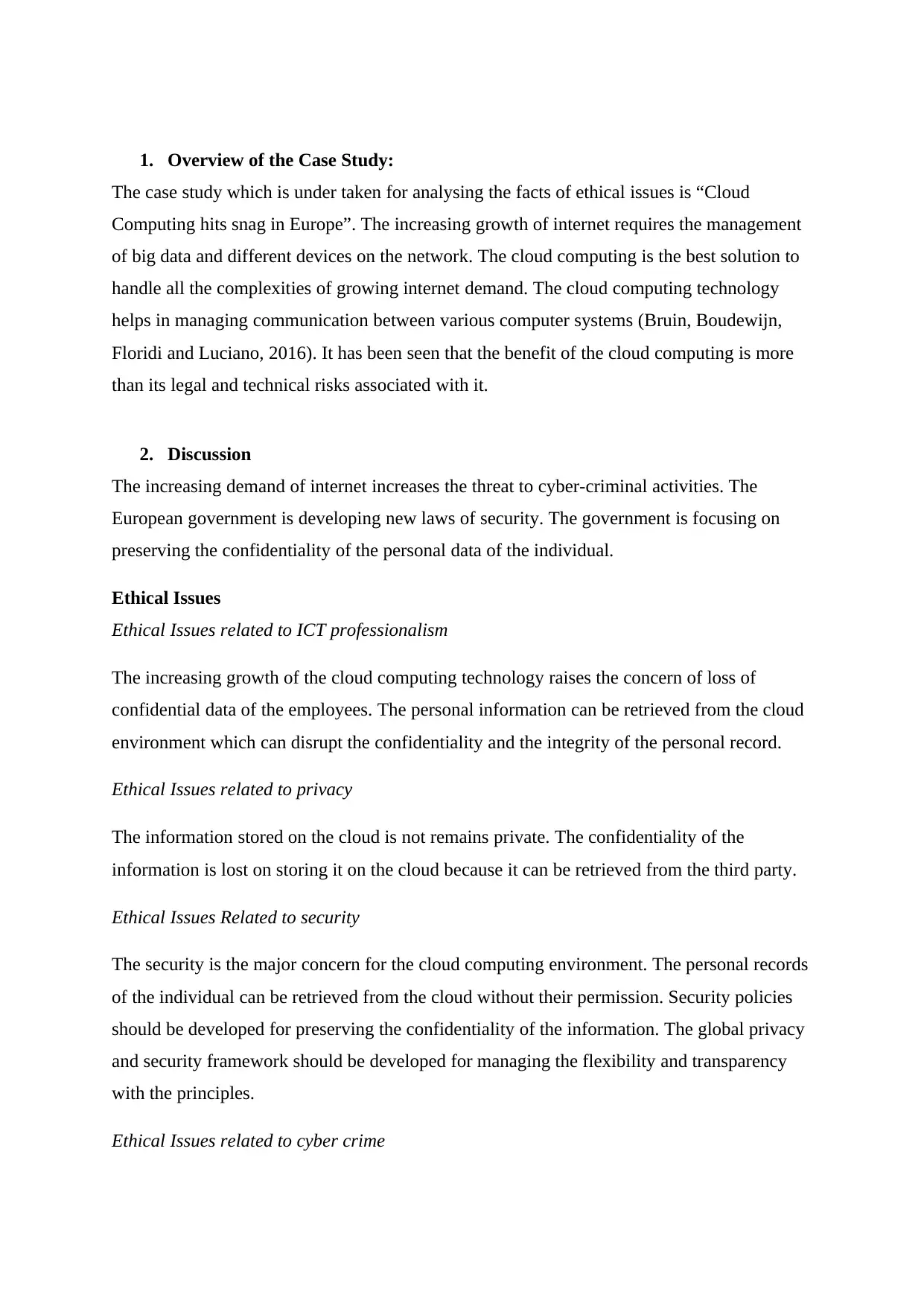
1. Overview of the Case Study:
The case study which is under taken for analysing the facts of ethical issues is “Cloud
Computing hits snag in Europe”. The increasing growth of internet requires the management
of big data and different devices on the network. The cloud computing is the best solution to
handle all the complexities of growing internet demand. The cloud computing technology
helps in managing communication between various computer systems (Bruin, Boudewijn,
Floridi and Luciano, 2016). It has been seen that the benefit of the cloud computing is more
than its legal and technical risks associated with it.
2. Discussion
The increasing demand of internet increases the threat to cyber-criminal activities. The
European government is developing new laws of security. The government is focusing on
preserving the confidentiality of the personal data of the individual.
Ethical Issues
Ethical Issues related to ICT professionalism
The increasing growth of the cloud computing technology raises the concern of loss of
confidential data of the employees. The personal information can be retrieved from the cloud
environment which can disrupt the confidentiality and the integrity of the personal record.
Ethical Issues related to privacy
The information stored on the cloud is not remains private. The confidentiality of the
information is lost on storing it on the cloud because it can be retrieved from the third party.
Ethical Issues Related to security
The security is the major concern for the cloud computing environment. The personal records
of the individual can be retrieved from the cloud without their permission. Security policies
should be developed for preserving the confidentiality of the information. The global privacy
and security framework should be developed for managing the flexibility and transparency
with the principles.
Ethical Issues related to cyber crime
The case study which is under taken for analysing the facts of ethical issues is “Cloud
Computing hits snag in Europe”. The increasing growth of internet requires the management
of big data and different devices on the network. The cloud computing is the best solution to
handle all the complexities of growing internet demand. The cloud computing technology
helps in managing communication between various computer systems (Bruin, Boudewijn,
Floridi and Luciano, 2016). It has been seen that the benefit of the cloud computing is more
than its legal and technical risks associated with it.
2. Discussion
The increasing demand of internet increases the threat to cyber-criminal activities. The
European government is developing new laws of security. The government is focusing on
preserving the confidentiality of the personal data of the individual.
Ethical Issues
Ethical Issues related to ICT professionalism
The increasing growth of the cloud computing technology raises the concern of loss of
confidential data of the employees. The personal information can be retrieved from the cloud
environment which can disrupt the confidentiality and the integrity of the personal record.
Ethical Issues related to privacy
The information stored on the cloud is not remains private. The confidentiality of the
information is lost on storing it on the cloud because it can be retrieved from the third party.
Ethical Issues Related to security
The security is the major concern for the cloud computing environment. The personal records
of the individual can be retrieved from the cloud without their permission. Security policies
should be developed for preserving the confidentiality of the information. The global privacy
and security framework should be developed for managing the flexibility and transparency
with the principles.
Ethical Issues related to cyber crime
⊘ This is a preview!⊘
Do you want full access?
Subscribe today to unlock all pages.

Trusted by 1+ million students worldwide
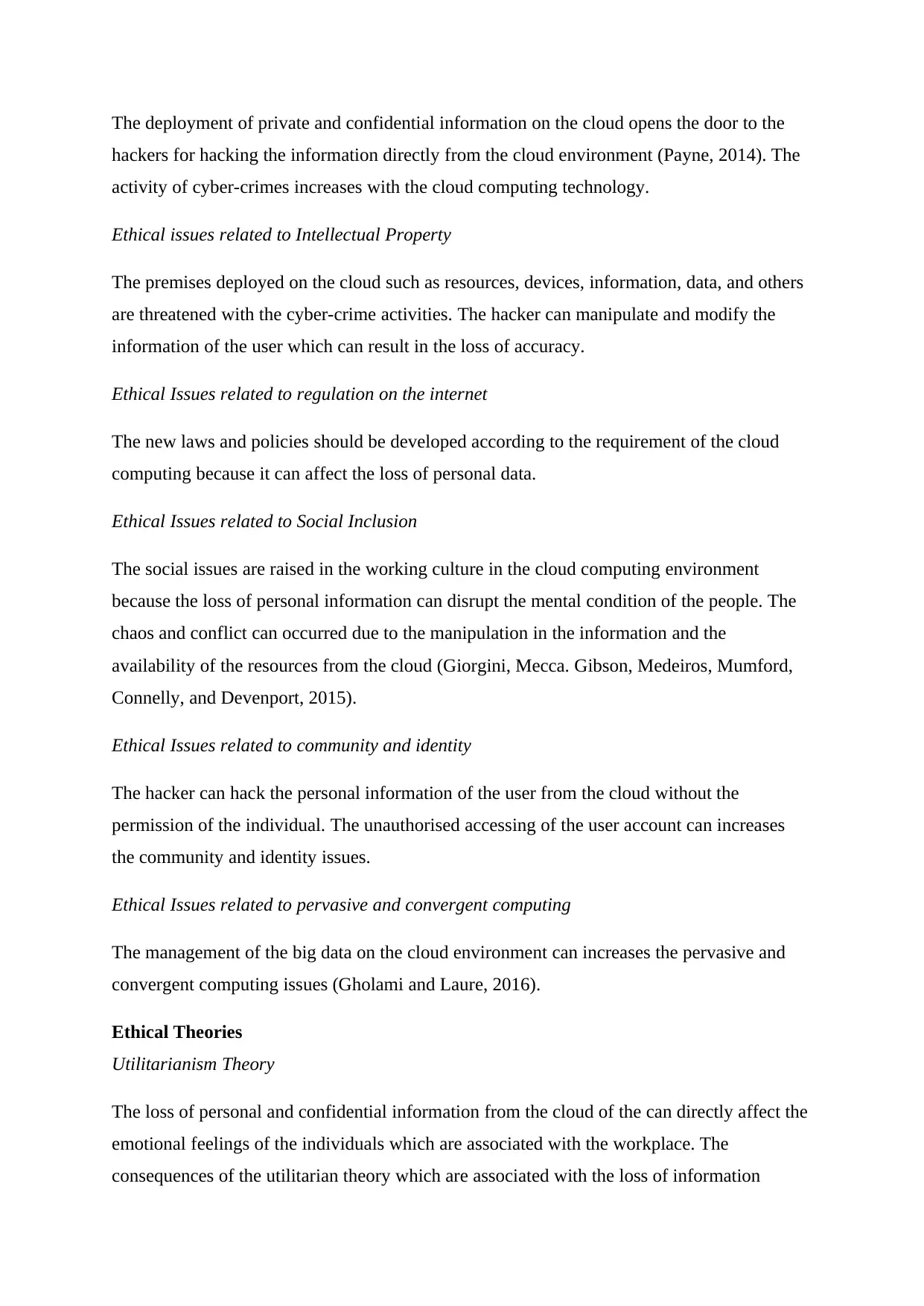
The deployment of private and confidential information on the cloud opens the door to the
hackers for hacking the information directly from the cloud environment (Payne, 2014). The
activity of cyber-crimes increases with the cloud computing technology.
Ethical issues related to Intellectual Property
The premises deployed on the cloud such as resources, devices, information, data, and others
are threatened with the cyber-crime activities. The hacker can manipulate and modify the
information of the user which can result in the loss of accuracy.
Ethical Issues related to regulation on the internet
The new laws and policies should be developed according to the requirement of the cloud
computing because it can affect the loss of personal data.
Ethical Issues related to Social Inclusion
The social issues are raised in the working culture in the cloud computing environment
because the loss of personal information can disrupt the mental condition of the people. The
chaos and conflict can occurred due to the manipulation in the information and the
availability of the resources from the cloud (Giorgini, Mecca. Gibson, Medeiros, Mumford,
Connelly, and Devenport, 2015).
Ethical Issues related to community and identity
The hacker can hack the personal information of the user from the cloud without the
permission of the individual. The unauthorised accessing of the user account can increases
the community and identity issues.
Ethical Issues related to pervasive and convergent computing
The management of the big data on the cloud environment can increases the pervasive and
convergent computing issues (Gholami and Laure, 2016).
Ethical Theories
Utilitarianism Theory
The loss of personal and confidential information from the cloud of the can directly affect the
emotional feelings of the individuals which are associated with the workplace. The
consequences of the utilitarian theory which are associated with the loss of information
hackers for hacking the information directly from the cloud environment (Payne, 2014). The
activity of cyber-crimes increases with the cloud computing technology.
Ethical issues related to Intellectual Property
The premises deployed on the cloud such as resources, devices, information, data, and others
are threatened with the cyber-crime activities. The hacker can manipulate and modify the
information of the user which can result in the loss of accuracy.
Ethical Issues related to regulation on the internet
The new laws and policies should be developed according to the requirement of the cloud
computing because it can affect the loss of personal data.
Ethical Issues related to Social Inclusion
The social issues are raised in the working culture in the cloud computing environment
because the loss of personal information can disrupt the mental condition of the people. The
chaos and conflict can occurred due to the manipulation in the information and the
availability of the resources from the cloud (Giorgini, Mecca. Gibson, Medeiros, Mumford,
Connelly, and Devenport, 2015).
Ethical Issues related to community and identity
The hacker can hack the personal information of the user from the cloud without the
permission of the individual. The unauthorised accessing of the user account can increases
the community and identity issues.
Ethical Issues related to pervasive and convergent computing
The management of the big data on the cloud environment can increases the pervasive and
convergent computing issues (Gholami and Laure, 2016).
Ethical Theories
Utilitarianism Theory
The loss of personal and confidential information from the cloud of the can directly affect the
emotional feelings of the individuals which are associated with the workplace. The
consequences of the utilitarian theory which are associated with the loss of information
Paraphrase This Document
Need a fresh take? Get an instant paraphrase of this document with our AI Paraphraser
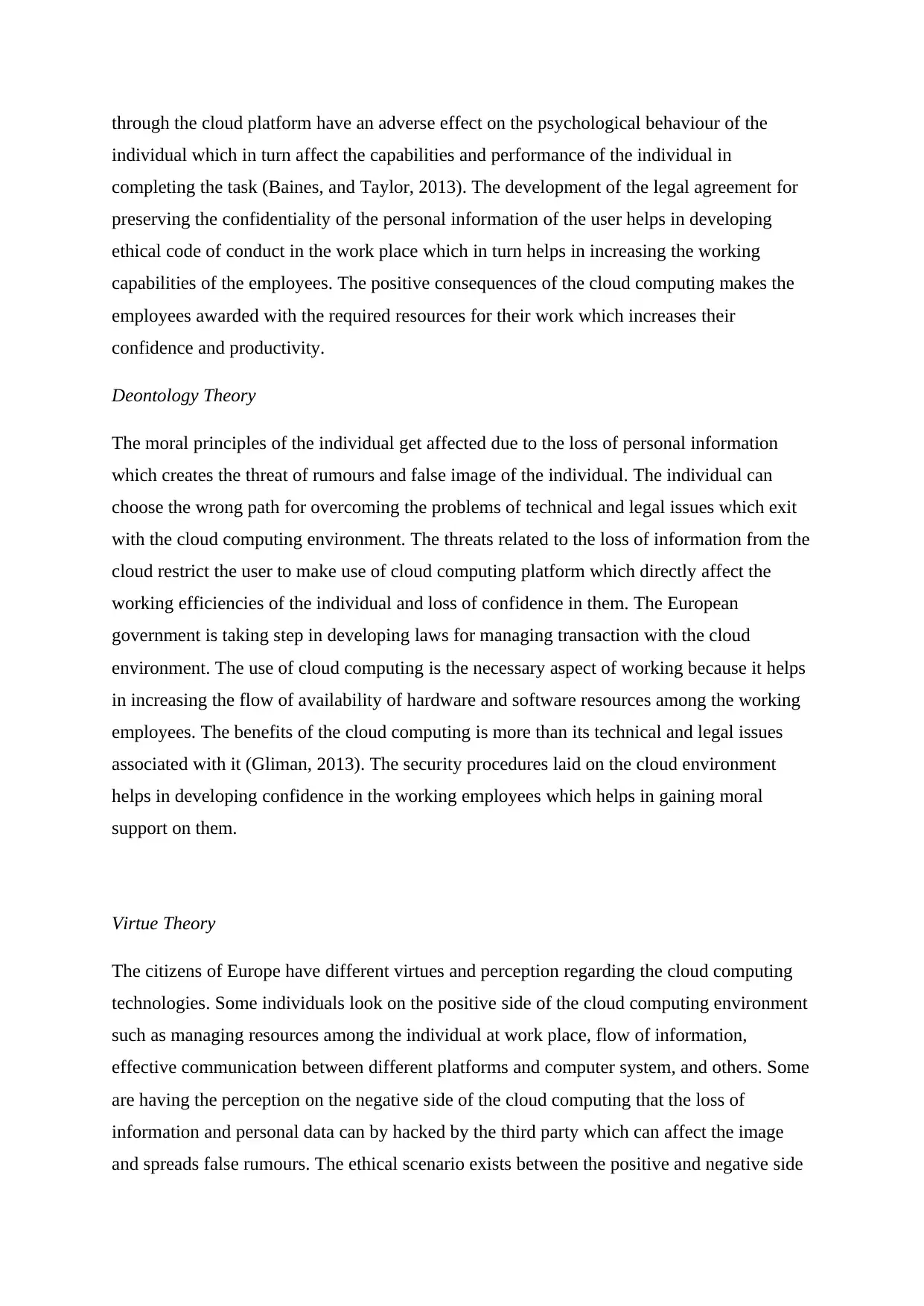
through the cloud platform have an adverse effect on the psychological behaviour of the
individual which in turn affect the capabilities and performance of the individual in
completing the task (Baines, and Taylor, 2013). The development of the legal agreement for
preserving the confidentiality of the personal information of the user helps in developing
ethical code of conduct in the work place which in turn helps in increasing the working
capabilities of the employees. The positive consequences of the cloud computing makes the
employees awarded with the required resources for their work which increases their
confidence and productivity.
Deontology Theory
The moral principles of the individual get affected due to the loss of personal information
which creates the threat of rumours and false image of the individual. The individual can
choose the wrong path for overcoming the problems of technical and legal issues which exit
with the cloud computing environment. The threats related to the loss of information from the
cloud restrict the user to make use of cloud computing platform which directly affect the
working efficiencies of the individual and loss of confidence in them. The European
government is taking step in developing laws for managing transaction with the cloud
environment. The use of cloud computing is the necessary aspect of working because it helps
in increasing the flow of availability of hardware and software resources among the working
employees. The benefits of the cloud computing is more than its technical and legal issues
associated with it (Gliman, 2013). The security procedures laid on the cloud environment
helps in developing confidence in the working employees which helps in gaining moral
support on them.
Virtue Theory
The citizens of Europe have different virtues and perception regarding the cloud computing
technologies. Some individuals look on the positive side of the cloud computing environment
such as managing resources among the individual at work place, flow of information,
effective communication between different platforms and computer system, and others. Some
are having the perception on the negative side of the cloud computing that the loss of
information and personal data can by hacked by the third party which can affect the image
and spreads false rumours. The ethical scenario exists between the positive and negative side
individual which in turn affect the capabilities and performance of the individual in
completing the task (Baines, and Taylor, 2013). The development of the legal agreement for
preserving the confidentiality of the personal information of the user helps in developing
ethical code of conduct in the work place which in turn helps in increasing the working
capabilities of the employees. The positive consequences of the cloud computing makes the
employees awarded with the required resources for their work which increases their
confidence and productivity.
Deontology Theory
The moral principles of the individual get affected due to the loss of personal information
which creates the threat of rumours and false image of the individual. The individual can
choose the wrong path for overcoming the problems of technical and legal issues which exit
with the cloud computing environment. The threats related to the loss of information from the
cloud restrict the user to make use of cloud computing platform which directly affect the
working efficiencies of the individual and loss of confidence in them. The European
government is taking step in developing laws for managing transaction with the cloud
environment. The use of cloud computing is the necessary aspect of working because it helps
in increasing the flow of availability of hardware and software resources among the working
employees. The benefits of the cloud computing is more than its technical and legal issues
associated with it (Gliman, 2013). The security procedures laid on the cloud environment
helps in developing confidence in the working employees which helps in gaining moral
support on them.
Virtue Theory
The citizens of Europe have different virtues and perception regarding the cloud computing
technologies. Some individuals look on the positive side of the cloud computing environment
such as managing resources among the individual at work place, flow of information,
effective communication between different platforms and computer system, and others. Some
are having the perception on the negative side of the cloud computing that the loss of
information and personal data can by hacked by the third party which can affect the image
and spreads false rumours. The ethical scenario exists between the positive and negative side
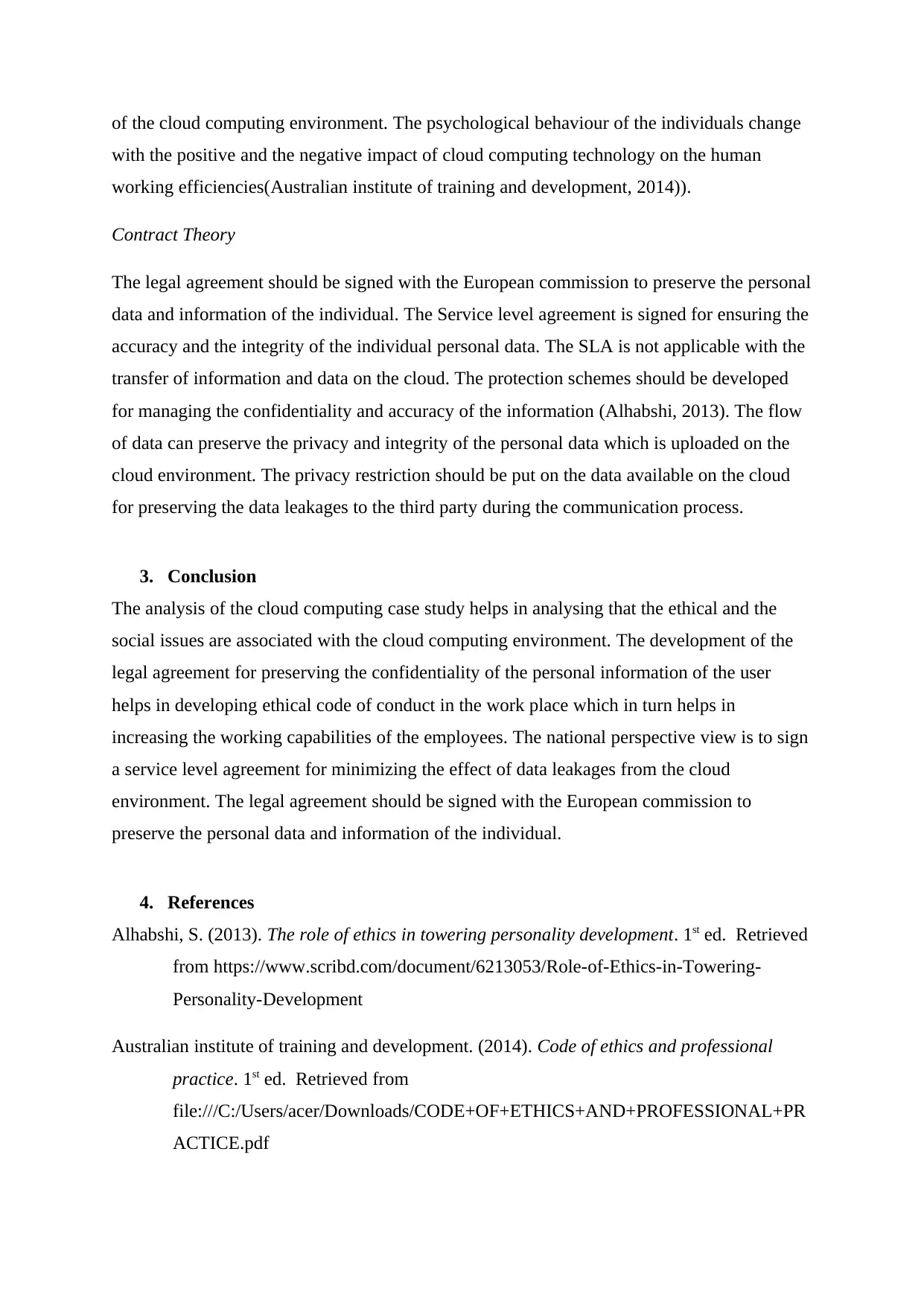
of the cloud computing environment. The psychological behaviour of the individuals change
with the positive and the negative impact of cloud computing technology on the human
working efficiencies(Australian institute of training and development, 2014)).
Contract Theory
The legal agreement should be signed with the European commission to preserve the personal
data and information of the individual. The Service level agreement is signed for ensuring the
accuracy and the integrity of the individual personal data. The SLA is not applicable with the
transfer of information and data on the cloud. The protection schemes should be developed
for managing the confidentiality and accuracy of the information (Alhabshi, 2013). The flow
of data can preserve the privacy and integrity of the personal data which is uploaded on the
cloud environment. The privacy restriction should be put on the data available on the cloud
for preserving the data leakages to the third party during the communication process.
3. Conclusion
The analysis of the cloud computing case study helps in analysing that the ethical and the
social issues are associated with the cloud computing environment. The development of the
legal agreement for preserving the confidentiality of the personal information of the user
helps in developing ethical code of conduct in the work place which in turn helps in
increasing the working capabilities of the employees. The national perspective view is to sign
a service level agreement for minimizing the effect of data leakages from the cloud
environment. The legal agreement should be signed with the European commission to
preserve the personal data and information of the individual.
4. References
Alhabshi, S. (2013). The role of ethics in towering personality development. 1st ed. Retrieved
from https://www.scribd.com/document/6213053/Role-of-Ethics-in-Towering-
Personality-Development
Australian institute of training and development. (2014). Code of ethics and professional
practice. 1st ed. Retrieved from
file:///C:/Users/acer/Downloads/CODE+OF+ETHICS+AND+PROFESSIONAL+PR
ACTICE.pdf
with the positive and the negative impact of cloud computing technology on the human
working efficiencies(Australian institute of training and development, 2014)).
Contract Theory
The legal agreement should be signed with the European commission to preserve the personal
data and information of the individual. The Service level agreement is signed for ensuring the
accuracy and the integrity of the individual personal data. The SLA is not applicable with the
transfer of information and data on the cloud. The protection schemes should be developed
for managing the confidentiality and accuracy of the information (Alhabshi, 2013). The flow
of data can preserve the privacy and integrity of the personal data which is uploaded on the
cloud environment. The privacy restriction should be put on the data available on the cloud
for preserving the data leakages to the third party during the communication process.
3. Conclusion
The analysis of the cloud computing case study helps in analysing that the ethical and the
social issues are associated with the cloud computing environment. The development of the
legal agreement for preserving the confidentiality of the personal information of the user
helps in developing ethical code of conduct in the work place which in turn helps in
increasing the working capabilities of the employees. The national perspective view is to sign
a service level agreement for minimizing the effect of data leakages from the cloud
environment. The legal agreement should be signed with the European commission to
preserve the personal data and information of the individual.
4. References
Alhabshi, S. (2013). The role of ethics in towering personality development. 1st ed. Retrieved
from https://www.scribd.com/document/6213053/Role-of-Ethics-in-Towering-
Personality-Development
Australian institute of training and development. (2014). Code of ethics and professional
practice. 1st ed. Retrieved from
file:///C:/Users/acer/Downloads/CODE+OF+ETHICS+AND+PROFESSIONAL+PR
ACTICE.pdf
⊘ This is a preview!⊘
Do you want full access?
Subscribe today to unlock all pages.

Trusted by 1+ million students worldwide
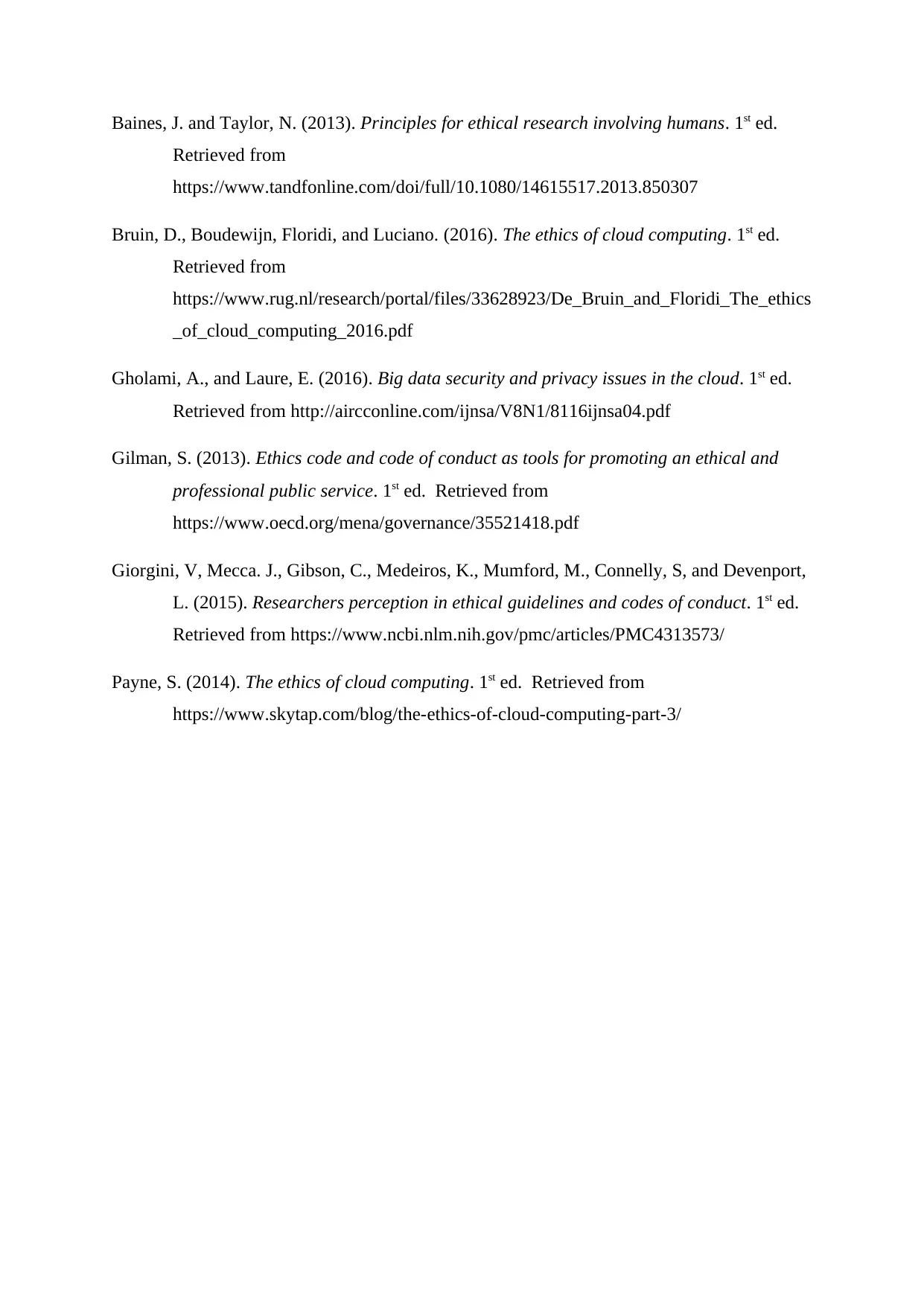
Baines, J. and Taylor, N. (2013). Principles for ethical research involving humans. 1st ed.
Retrieved from
https://www.tandfonline.com/doi/full/10.1080/14615517.2013.850307
Bruin, D., Boudewijn, Floridi, and Luciano. (2016). The ethics of cloud computing. 1st ed.
Retrieved from
https://www.rug.nl/research/portal/files/33628923/De_Bruin_and_Floridi_The_ethics
_of_cloud_computing_2016.pdf
Gholami, A., and Laure, E. (2016). Big data security and privacy issues in the cloud. 1st ed.
Retrieved from http://aircconline.com/ijnsa/V8N1/8116ijnsa04.pdf
Gilman, S. (2013). Ethics code and code of conduct as tools for promoting an ethical and
professional public service. 1st ed. Retrieved from
https://www.oecd.org/mena/governance/35521418.pdf
Giorgini, V, Mecca. J., Gibson, C., Medeiros, K., Mumford, M., Connelly, S, and Devenport,
L. (2015). Researchers perception in ethical guidelines and codes of conduct. 1st ed.
Retrieved from https://www.ncbi.nlm.nih.gov/pmc/articles/PMC4313573/
Payne, S. (2014). The ethics of cloud computing. 1st ed. Retrieved from
https://www.skytap.com/blog/the-ethics-of-cloud-computing-part-3/
Retrieved from
https://www.tandfonline.com/doi/full/10.1080/14615517.2013.850307
Bruin, D., Boudewijn, Floridi, and Luciano. (2016). The ethics of cloud computing. 1st ed.
Retrieved from
https://www.rug.nl/research/portal/files/33628923/De_Bruin_and_Floridi_The_ethics
_of_cloud_computing_2016.pdf
Gholami, A., and Laure, E. (2016). Big data security and privacy issues in the cloud. 1st ed.
Retrieved from http://aircconline.com/ijnsa/V8N1/8116ijnsa04.pdf
Gilman, S. (2013). Ethics code and code of conduct as tools for promoting an ethical and
professional public service. 1st ed. Retrieved from
https://www.oecd.org/mena/governance/35521418.pdf
Giorgini, V, Mecca. J., Gibson, C., Medeiros, K., Mumford, M., Connelly, S, and Devenport,
L. (2015). Researchers perception in ethical guidelines and codes of conduct. 1st ed.
Retrieved from https://www.ncbi.nlm.nih.gov/pmc/articles/PMC4313573/
Payne, S. (2014). The ethics of cloud computing. 1st ed. Retrieved from
https://www.skytap.com/blog/the-ethics-of-cloud-computing-part-3/
1 out of 7
Related Documents
Your All-in-One AI-Powered Toolkit for Academic Success.
+13062052269
info@desklib.com
Available 24*7 on WhatsApp / Email
![[object Object]](/_next/static/media/star-bottom.7253800d.svg)
Unlock your academic potential
Copyright © 2020–2026 A2Z Services. All Rights Reserved. Developed and managed by ZUCOL.





